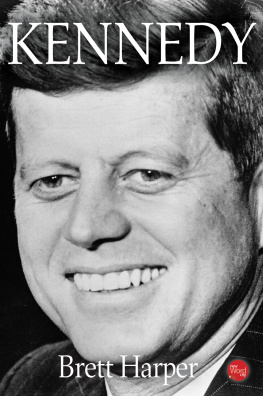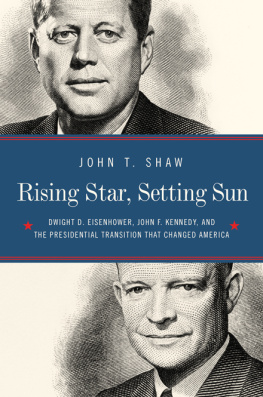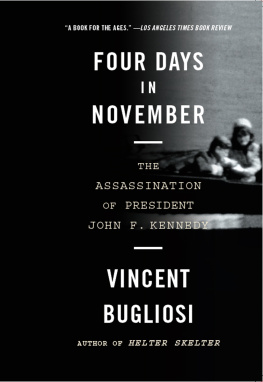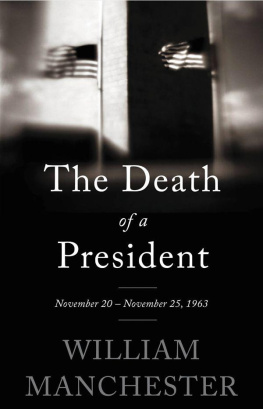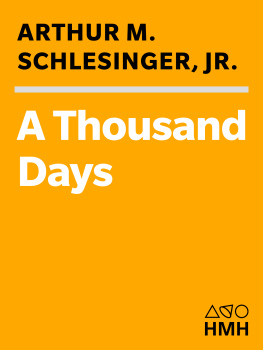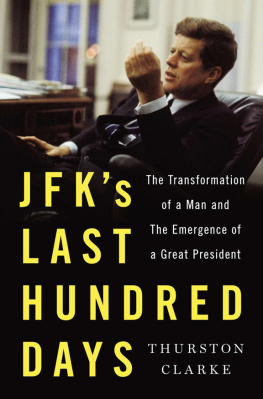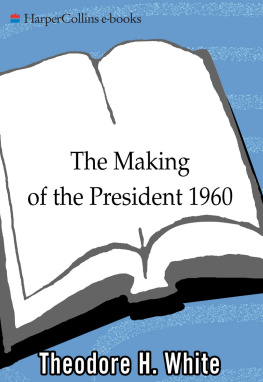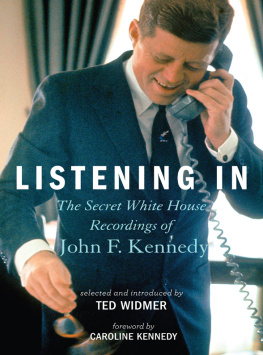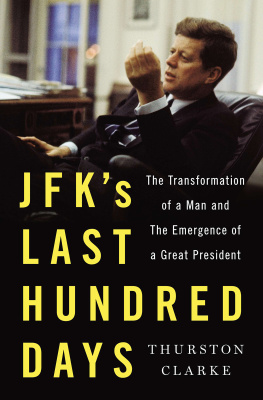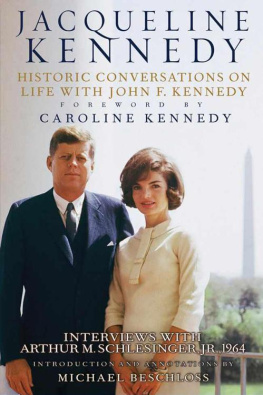Richard Reeves - President Kennedy: Profile of Power
Here you can read online Richard Reeves - President Kennedy: Profile of Power full text of the book (entire story) in english for free. Download pdf and epub, get meaning, cover and reviews about this ebook. year: 2011, publisher: Simon & Schuster, genre: Detective and thriller. Description of the work, (preface) as well as reviews are available. Best literature library LitArk.com created for fans of good reading and offers a wide selection of genres:
Romance novel
Science fiction
Adventure
Detective
Science
History
Home and family
Prose
Art
Politics
Computer
Non-fiction
Religion
Business
Children
Humor
Choose a favorite category and find really read worthwhile books. Enjoy immersion in the world of imagination, feel the emotions of the characters or learn something new for yourself, make an fascinating discovery.

- Book:President Kennedy: Profile of Power
- Author:
- Publisher:Simon & Schuster
- Genre:
- Year:2011
- Rating:4 / 5
- Favourites:Add to favourites
- Your mark:
- 80
- 1
- 2
- 3
- 4
- 5
President Kennedy: Profile of Power: summary, description and annotation
We offer to read an annotation, description, summary or preface (depends on what the author of the book "President Kennedy: Profile of Power" wrote himself). If you haven't found the necessary information about the book — write in the comments, we will try to find it.
President Kennedy is the compelling, dramatic history of JFKs thousand days in office. It illuminates the presidential center of power by providing an indepth look at the day-by-day decisions and dilemmas of the thirty-fifth president as he faced everything from the threat of nuclear war abroad to racial unrest at home.
President Kennedy: Profile of Power — read online for free the complete book (whole text) full work
Below is the text of the book, divided by pages. System saving the place of the last page read, allows you to conveniently read the book "President Kennedy: Profile of Power" online for free, without having to search again every time where you left off. Put a bookmark, and you can go to the page where you finished reading at any time.
Font size:
Interval:
Bookmark:
Thank you for purchasing this Touchstone Book eBook.
Sign up for our newsletter and receive special offers, access to bonus content, and info on the latest new releases and other great eBooks from Touchstone Book and Simon & Schuster.

or visit us online to sign up at
eBookNews.SimonandSchuster.com

A LSO BY R ICHARD R EEVES
The Reagan Detour
Passage to Peshawar
American Journey: Traveling with
Tocqueville in Search of
Democracy in America
Convention
A Ford, Not a Lincoln


TOUCHSTONE
Rockefeller Center
1230 Avenue of the Americas
New York, New York 10020
www.SimonandSchuster.com
Copyright 1993 by Reeves-ONeill, Inc.
All rights reserved
including the right of reproduction
in whole or in part in any form.
First Touchstone Edition 1994
TOUCHSTONE and colophon are registered trademarks
of Simon & Schuster Inc.
Designed by Levavi & Levavi
Photo research by Natalie Goldstein
Manufactured in the United States of America
7 9 10 8
Library of Congress Cataloging-in-Publication Data
Reeves, Richard.
President Kennedy : profile of power /Richard Reeves.
p. cm.
Includes bibliographical references (p.) and index.
1. Kennedy, John F. (John Fitzgerald), 19171963. 2. United
StatesPolitics and government19611963. 3. PresidentsUnited
StatesBiography. I. Title.
E842.R358 1993
973.922092dc20
[B] | 93-24805 |
ISBN: 0-671-64879-9
ISBN: 0-671-89289-4 (pbk)
ISBN: 978-0-6718-9289-0 (print)
ISBN: 978-1-4391-2754-4 (eBook)
The excerpt from The Oracles on is taken from The
Collected Poems of A. E. Housman. Copyright 1922 by Henry Holt
and Company, Inc. Copyright 1950 by Barclays Bank Ltd.
Reprinted by permission of Henry Holt and Company, Inc.
This book is for Fiona ONeill Reeves
And for her mother, Catherine ONeill
And her grandmothers, Dorothy Forshay Reeves
and Bridget Ruddy Vesey
John F. Kennedys favorite book was Melbourne by David Cecil, the biography of William Lamb, Viscount Melbourne, who was prime minister of Great Britain for seven years, from 1834 to 1841, serving as the political mentor of Queen Victoria. The book was published in 1939 and this is part of Cecils description of the young William Lamb:
To be a thinker one must believe in the value of disinterested thought. Williams education had destroyed his belief in this, along with all other absolute beliefs, and in doing so removed the motive force necessary to set his creative energy working. The spark that should have kindled his fire was unlit, with the result that he never felt moved to make the effort needed to discipline his intellectual processes, to organize his sporadic reflections into a coherent system of thought. He had studied a great many subjects, but none thoroughly; his ideas were original, but they were fragmentary, scattered, unmatured. This lack of system meant further that he never overhauled his mind to set its contents in order in the light of a considered standard of valueso that the precious and the worthless jostled each other in its confused recesses; side by side with fresh and vivid thoughts lurked contradictions, commonplaces and relics of the conventional prejudices of his rank and station. Even his scepticism was not consistent; though he doubted the value of virtue, he never doubted the value of being a gentleman. Like so many aristocratic persons he was an amateur.
His amateurishness was increased by his hedonism. For it led him to pursue his thought only in so far as the process was pleasant. He shirked intellectual drudgery. Besides, the life he lived was all too full of distracting delights. If he felt bored reading and cogitating, there was always a party for him to go to where he could be perfectly happy without having to make an effort. Such temptations were particularly hard to resist for a man brought up in the easygoing, disorderly atmosphere of Melbourne House, where no one was ever forced to be methodical or conscientious and where there was always something entertaining going on. If virtue was hard to acquire there, pleasure came all too easily.
PRESIDENT KENNEDY
The Emperor, Ryszard Kapuscinskis book about the fall of Emperor Haile Selassie of Ethiopia, begins with the writer searching through Addis Ababa for the men who once were Selassies court. Each tells his story of life around the King of Kings, from the man who took down every spoken word, the Minister of the Pen, to the high and rich officials whose lives could be made or broken by a glance or the hint of a frown in public from the man at the center of the world they knew.
It was a marvelous portrayal of life at court, the circle around power. Reading it, though, I found myself wondering what this all looked like to Selassie. What was it like at the center? Knowing little of emperors or Ethiopia, I began to think about what it was like to be the President of the United States. Though I had written books on three Presidents and had talked and corresponded with a fourth over the years, I realized that most of what I knew, or thought I knew, was basically the testimony of the men and women of White House courts, the circles around the power of each of those Presidents.
Eventually those thoughts focused on John F. Kennedy, the 35th President. I thought there were enough witnesses and enough records to try to reconstruct his world from his perspective. I was interested in what he knew and when he knew it and what he actually didsometimes day by day, sometimes hour by hour, sometimes minute by minute. The timing was right, it seemed to me. Kennedy came to power at the end of an old era or the beginning of a new, which was important because his words and actions were recorded in new ways. The pulse of communication speeded up in his time. At the beginning, his presidency was recorded by stenographers and typists; secretaries listened in and took notes during telephone calls. There were things we never see anymore: carbon paper, stencils, mimeographs, vacuum tubes and flashbulbs. Three years later, there were transistors, television sets in almost every home and tape recorders and Xerox machines in offices. Because of jet airliners, Americans suddenly lived only six hours from Europe.
The timing also seemed right to me because of the availability of new information and insight. The end of the Cold War resulted in new sources of documents and interviews, particularly in Moscow. A central reality of Kennedys presidency was being the first modern Commander-in-Chief who came to office facing the possibility that a potential enemy had the military power to destroy the United States; the size of the Atlantic and the Pacific could not stop nuclear missiles launched from the Soviet Union. The Freedom of Information Act has opened new windows to the extraordinary events of those yearsin Moscow and Washington, in Berlin, Birmingham, and Havana. Although far too much information is still hidden by government classification procedures and the defensiveness of the Kennedy family, it is now possible to separate fact from imagery in relations between Kennedy and the other significant men of power in the early 1960s, including former President Eisenhower, Premier Khrushchev, Charles de Gaulle, Harold Macmillan, Fidel Castro, Ngo Dinh Diem, Martin Luther King, Jr., and the Presidents own men, particularly Robert Kennedy and Robert McNamara.
Next pageFont size:
Interval:
Bookmark:
Similar books «President Kennedy: Profile of Power»
Look at similar books to President Kennedy: Profile of Power. We have selected literature similar in name and meaning in the hope of providing readers with more options to find new, interesting, not yet read works.
Discussion, reviews of the book President Kennedy: Profile of Power and just readers' own opinions. Leave your comments, write what you think about the work, its meaning or the main characters. Specify what exactly you liked and what you didn't like, and why you think so.

